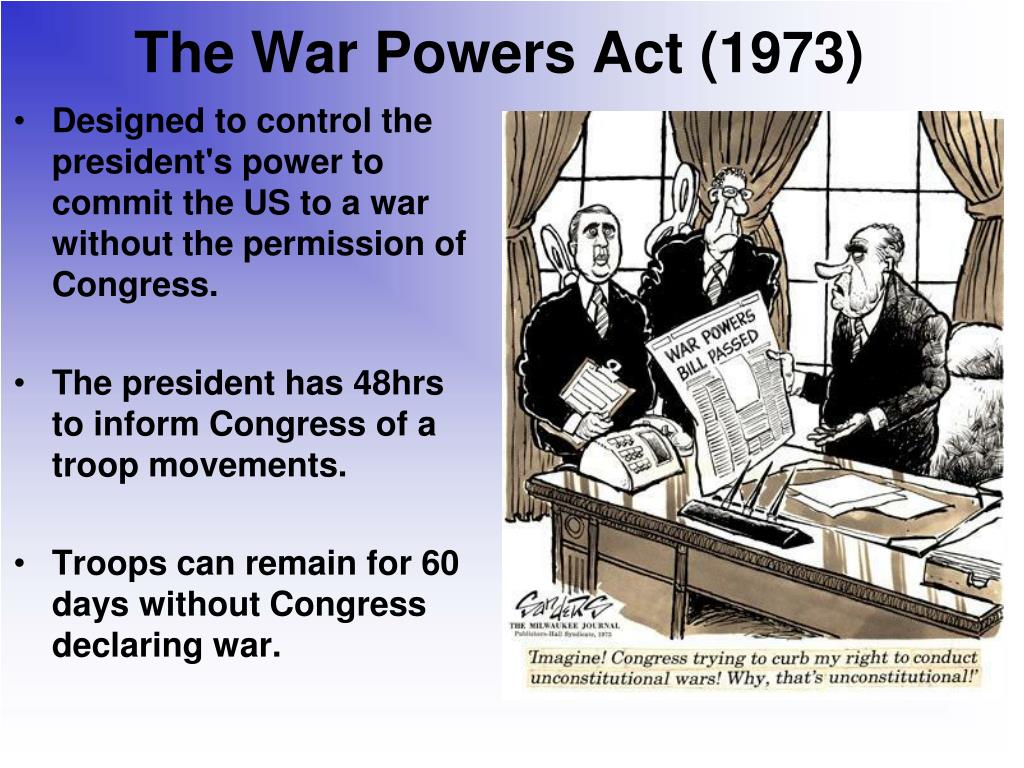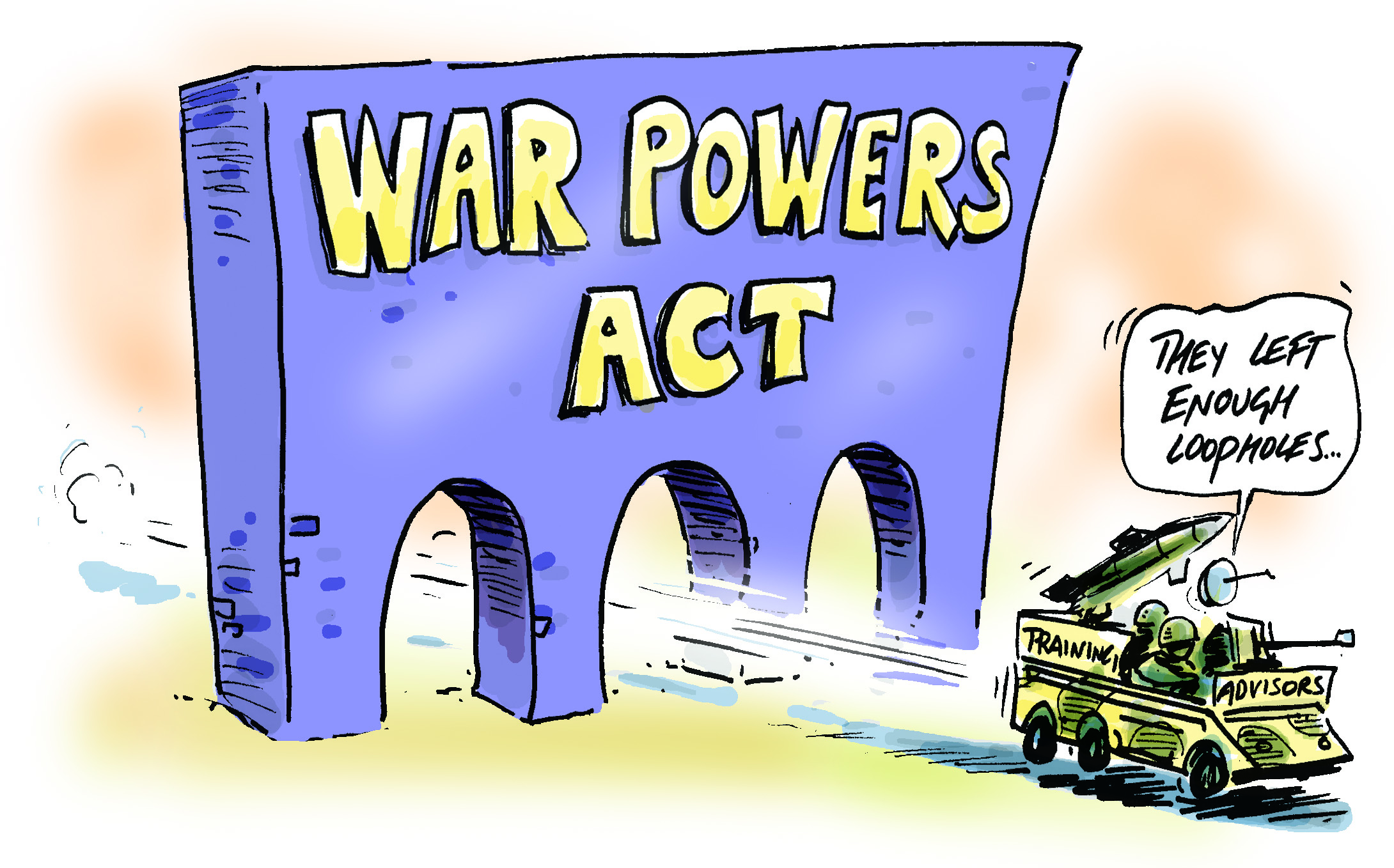
US Discloses Decades of
Memos on Presidential War Powers
Charlie Savage / The New York Times
Executive branch lawyers secretly worked to limit the reach of a post-Vietnam War law, according to a trove of opinions from the Office of Legal Counsel.
WASHINGTON (September 16, 2022) — Justice Department lawyers have secretly worked under presidents of both parties to narrowly interpret the reach of a law passed at the end of the Vietnam War meant to reassert Congress’s constitutional role in deciding whether to go to war, newly disclosed memos show.
The Office of Legal Counsel drafted the memos in the decades after Congress enacted that law, the War Powers Resolution of 1973. The writings shaped White House interpretations of its constraints in ways not disclosed to Congress or the public, and their release sheds light on the inner workings of executive branch lawyers seeking to protect or expand presidential power.
Among the writings: a memo by Antonin Scalia, the future Supreme Court justice, blessing President Gerald R. Ford’s desire to send troops back to Vietnam in 1975 for the evacuation of Saigon, and another written in 1993 scrutinizing which parts of the law President Bill Clinton could disregard as unconstitutional, in what appears to be the office’s seminal work on the law.
The tranche also covers various post-World War II issues, like the Harry S. Truman administration bringing Nazi scientists to the United States; ending the classification of Japanese people as “alien enemies”; and weighing whether to send peacekeeping troops to the Middle East as part of the 1948 establishment of Israel.
The Knight First Amendment Institute at Columbia University obtained the memos through a Freedom of Information Act lawsuit and provided them to The New York Times. They open a window into how executive branch lawyers can expand White House power, allowing presidents to feel free to act in ways Congress sought to constrain.
“The collection of previously unreleased war powers memos from the Office of Legal Counsel offers new insights into important historical moments, but it also has significance today,” said Oona Hathaway, a Yale Law School professor who gained early access to the documents.
“Because war powers issues almost never get litigated on the merits in court, the OLC’s legal opinion is often the only one that matters,” Ms. Hathaway added. “Moreover, the office treats its prior memos as precedential — so understanding war powers law requires understanding these prior memos. Yet, until now, no one else has been able to see them.”
She and other legal specialists said the memos about the War Powers Resolution were particularly significant.
Congress passed that law — overriding the veto of President Richard M. Nixon — a quarter-century into the Cold War, a period giving rise to what is sometimes called “the imperial presidency,” during which the authority of the legislative branch to control when to go to war had seriously eroded. Among other things, the resolution states that presidents may only deploy forces into hostilities to repel an attack on the United States or with Congress’s prior permission.
Many legal specialists have since come to see the resolution as a largely failed effort at reining in presidential war-making powers. Executive branch lawyers have found ways to allow subsequent presidents to unilaterally deploy troops, while Congress has largely acquiesced.
Against that backdrop, several memos deepen the understanding of how executive branch lawyers sought to interpret the law in ways favorable to what the presidents they worked for wanted to do, creating precedents subsequent presidents would build upon.
In 1975, for example, Communist North Vietnam re-invaded South Vietnam. Ford wanted to send troops back to Saigon to evacuate both Americans and Vietnamese whose lives were in danger because they had worked with Americans.
Scalia, then the head of the Office of Legal Counsel, said the president could. While the resolution’s narrow limit for when a president may dispatch troops into hostilities without congressional authorization “would clearly prevent all of the action contemplated,” he wrote, it should not be interpreted as binding law.

And though it would be illegal for Ford to unilaterally return troops to Vietnam to enable Americans to be permanently stationed there or for the sole purpose of evacuating South Vietnamese citizens, Scalia wrote, the president had constitutional authority to do so to evacuate Americans. While they were there, they could extract South Vietnamese, too, he added.
Ms. Hathaway said, “I think there’s a good case to be made that this memo marks the beginning of the end of the War Powers Resolution.”
The Knight First Amendment Institute, along with the Campaign for Accountability and five historians, sought memos that are at least 25 years old after Congress in 2016 curtailed the government’s ability to indefinitely keep secret older deliberative documents. The case has resulted in a wave of disclosures of secret Justice Department memos.
More than 500 other opinions have been released, along with a list of numerous unclassified memos written from 1945 to early 1994. Previously released documents cover topics like the civil rights movement or the enactment of the Foreign Intelligence Surveillance Act, or FISA.
The Office of Legal Counsel became a center of controversy for its role in secretly blessing some of the George W. Bush administration’s responses to the terrorist attacks of Sept. 11, 2001. Those decisions were based on sweeping claims that a president, as commander in chief, can lawfully override statutes and treaties, including by approving the C.I.A.’s torture of detainees.
Jameel Jaffer, the director of the Knight institute, argued that the memos underscored that too much secrecy surrounded the government’s understanding of the law presidents must obey. He argued that the office should be required to routinely publish its contemporaneous work, “except in the most extraordinary circumstances.”
Critics have resisted that idea, arguing that it could instead deter officials from asking the Justice Department to evaluate the legality of ideas. If the office publicly revealed that it believed a proposal would be illegal, that would be politically embarrassing, they have posited.
Among the most significant of the newly disclosed documents, several legal scholars said, is a memo Daniel L. Koffsky, a longtime career lawyer in the Office of Legal Counsel, completed for the Clinton administration in June 1993.

That 84-page memo, according to people who were recently in government, appears to remain the executive branch’s most extensive analysis of the War Powers Resolution. It surveys the early debates among the country’s founders about the division of war powers between Congress and the president and later developments, and it dissects each provision in turn.
Among the aspects of the memo that may come under greater scrutiny is its treatment of the resolution’s so-called 60-day clock. That provision says if a president unilaterally deploys troops into hostilities and Congress does not authorize the mission in two months, the forces must be withdrawn.
No president has openly defied that provision on the basis of deeming it unconstitutional, but many administrations have chafed against it. Two Democratic leaders invoked disputed interpretations of the law in deciding to continue participating in congressionally unauthorized NATO air wars that lasted more than 60 days: Mr. Clinton in Kosovo in 1999, and President Barack Obama in Libya in 2011.
The start of the 1993 memo says that while most scholars believed the 60-day clock was valid, “no administration has accepted the constitutionality of this provision.” But as the memo itself later acknowledges, the Carter administration did say it was constitutional, in a 1980 Office of Legal Counsel memo that has apparently never been revoked.
In all, the 1993 memo’s take on the 60-day clock was ambiguous. The memo compiled numerous statements by executive branch officials over the years expressing hostility toward its constitutionality, but it also said courts would likely uphold the provision as constitutional on its face.
Still, the memo said, the provision would be unconstitutional as applied to “extreme circumstances.” As an example, it said the Office of Legal Counsel was unlikely to say a president must abandon troops in a combat zone if an evacuation could not be completed by the end of a 30-day grace period the provision allows for withdrawal.
Jack Goldsmith, a Harvard Law School professor and former head of the Office of Legal Counsel, praised the disclosure of the memos.
“Issues about the president’s constitutional war power and the meaning of the War Powers Resolution are rarely adjudicated in court and are primarily interpreted by the executive branch in secret, so it’s impossible for the public to know what the executive branch thinks the scope of the president’s authority is,” he said. “For that reason, it’s vital that these unclassified memos be released.”
Posted in accordance with Title 17, Section 107, US Code, for noncommercial, educational purposes.